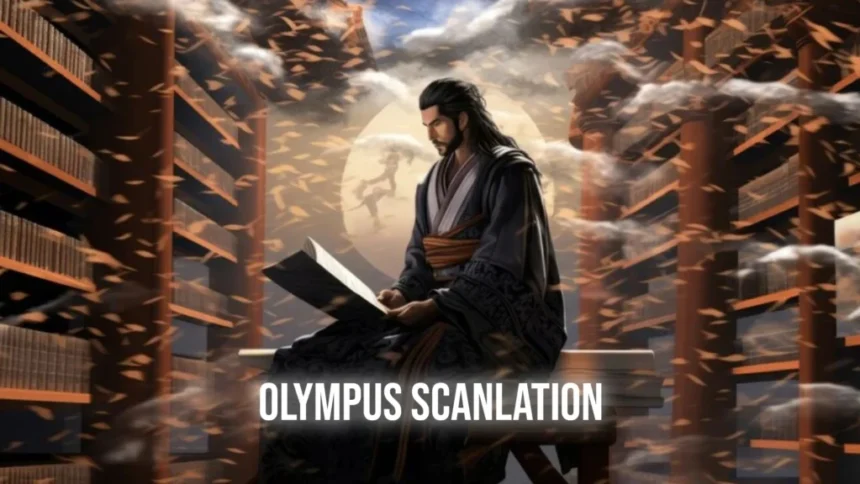Are you a manga enthusiast with a passion for bringing stories to life? Dreaming of launching your own Olympus scanlation project but don’t know where to start? You’re in the right place. Scanlation, the art of translating and editing manga for fans worldwide, has gained immense popularity. It opens up opportunities for creativity and community engagement.
Imagine taking captivating tales from Japan and sharing them with readers who can’t get enough. Whether it’s uncovering hidden gems or giving voice to beloved classics, starting an Olympus scanlation project can be both fulfilling and exciting. Let’s dive into everything you need to know about creating your very own olympus scanlation team—where stories come alive in new languages!
Understanding the World of olympus scanlation
olympus scanlation is more than just translating manga; it’s a community-driven effort. Fans from around the globe join forces to bridge language barriers, allowing others to enjoy their favorite series.
This world thrives on passion and creativity. Each olympus scanlation project requires an intricate blend of skills—translators, editors, and typesetters working together harmoniously. They transform raw manga into polished versions that resonate with readers.
The process often begins with acquiring the original artwork, called “raws.” From there, translators decode the text while capturing nuances and cultural references. Editors refine this work for clarity and flow before typesetting brings it all together visually.
Understanding this collaborative environment helps newcomers appreciate the dedication involved in each release. It’s not merely about sharing stories but fostering connections among fans who share similar interests across borders.
Steps to Starting Your Own Olympus Scanlation Project
Starting your own Olympus scanlation project can be an exhilarating journey. Begin by defining your vision. What type of manga do you want to bring to the English-speaking audience? This clarity will guide your next steps.
Research is essential. Familiarize yourself with existing scanlation communities and their practices. Understanding how others operate gives you insights into effective strategies.
Once you’ve laid the groundwork, select a name for your project that resonates with potential fans. A catchy title can draw interest from the start.
Next, establish a clear organizational structure. You’ll need roles defined—translators, editors, and typesetters are crucial for success.
Make sure to set achievable goals and timelines as well. This keeps everyone motivated and on track as you move forward in this exciting venture!
Gathering and Managing a Team of Translators, Editors, and Typesetters
Building a strong team is vital for your Olympus scanlation project. Start by finding passionate individuals who share your love for manga. Look for translators, editors, and typesetters in online communities or forums dedicated to manga.
Once you’ve gathered potential candidates, evaluate their skills through sample tests or past works. This ensures that everyone brings something valuable to the table. It’s essential to communicate clearly about expectations and deadlines from the outset.
Create a collaborative environment using tools like Discord or Slack for efficient communication. Setting up shared drives can help keep everyone organized with easy access to files.
Regular meetings can foster teamwork and allow you to address any challenges early on. A motivated team will make all the difference in producing high-quality scanlations while enjoying the creative process together.
Choosing the Right Projects and Obtaining Raw Manga
Choosing the right projects is crucial for your Olympus scanlation journey. Start by identifying genres that resonate with you and your potential audience. Look for popular titles or hidden gems that haven’t been translated yet.
Once you’ve selected a project, obtaining raw manga is the next step. There are various online sources where you can find high-quality scans. Sites like Japanese bookstores or forums dedicated to manga often have what you’re looking for.
Remember to prioritize quality over quantity. A well-done translation of a single chapter can make a lasting impact compared to rushed work on multiple volumes.
Engage with communities on social media platforms too; they might provide leads on lesser-known series worth translating. Building relationships in these spaces could lead you to unique opportunities and valuable resources.
Guidelines for Translation and Editing
When embarking on an Olympus scanlation project, clarity is key. Your translations should capture the essence of the original dialogue while remaining natural in your target language.
Focus on maintaining the author’s tone and style. This ensures that readers feel connected to the story’s intent. Avoid overly literal translations that may confuse or alienate your audience.
Editing plays a crucial role too. Encourage your editors to check for grammar, punctuation, and flow. They should also ensure consistency throughout the text, especially with character names or unique terms.
Cultural references can be tricky territory. Adapt them carefully so they resonate with local audiences without losing their significance.
Collaboration is vital during this process. Regular feedback loops between translators and editors will foster better quality work and allow everyone to learn from each other’s insights.
Typesetting Tips and Tools
Typesetting is a crucial aspect of any Olympus scanlation project. It involves placing text over images while ensuring readability and aesthetics. The right tools can make this process smoother.
Consider using software like Adobe InDesign or GIMP for your typesetting needs. Both offer robust features tailored for manga formatting. Free alternatives, such as Krita, also provide good functionality without breaking the bank.
Pay attention to font choices. Use clear, legible fonts that match the original tone of the manga. Avoid overly stylized fonts that may distract from the artwork or confuse readers.
Line spacing matters too. Ensure there’s enough space between lines to enhance readability but not so much that it feels disjointed.
Remember to maintain consistency throughout your project. This includes font sizes and styles across different chapters for a cohesive look and feel in your translated work.
Quality Control and Release Strategy
Quality control is crucial in any Olympus scanlation project. It ensures that every release meets high standards and resonates with readers. A meticulous review process can help catch errors before publication.
Establish a clear workflow for editing and proofreading. This step should involve multiple rounds of checks by different team members. Fresh eyes can often spot mistakes that others might overlook.
Release strategy also plays a vital role. Consider timing your releases to coincide with community events or popular titles gaining traction. Building anticipation can enhance engagement among fans.
Utilize social media platforms to announce upcoming chapters, creating buzz around your project. Collaborating with other scanlation groups may open doors for cross-promotion and increased visibility as well.
Remember, quality over quantity is the golden rule here; rushing can lead to subpar results that could tarnish your reputation within the community.
Promoting Your Scanlation Project
Promoting your Olympus scanlation project is essential for its success. Start by establishing a strong online presence. Create dedicated social media accounts on platforms like Twitter, Instagram, and Reddit to connect with potential readers.
Engage with the community by sharing updates and sneak peeks of upcoming releases. Use eye-catching visuals that highlight your work’s quality.
Consider collaborating with other scanlation groups or artists to expand your reach. Guest posts or cross-promotions can introduce your project to new audiences.
Utilize forums and Discord servers focused on manga discussions. Active participation will help you build relationships while promoting your scans organically.
Don’t underestimate the power of word-of-mouth marketing among fans. Encourage readers to share their favorites from your collection within their networks.
Host contests or giveaways related to manga themes in exchange for shares or retweets; this often results in increased visibility for everyone involved!
Dealing with Copyright Issues
Navigating copyright issues in scanlation can be tricky. It’s essential to understand the legal landscape surrounding manga and its translations.
Most published works are protected by copyright, meaning you can’t just share or modify them without permission. This includes raw manga that you might want to use for your Olympus scanlation project.
One approach is to look for titles that have fallen into public domain status. These works often provide a safer ground for translation and adaptation.
Another option is reaching out directly to publishers or authors. Some creators appreciate fan efforts and may grant permissions for specific projects.
Always credit original artists and maintain respect for their work. Transparency builds trust within the community, which can lead to better relationships with creators down the line. Keeping these principles in mind helps ensure your Olympus scanlation remains respectful and legally sound.
The Rewards of Running a Successful Olympus
Running a successful Olympus scanlation project can be incredibly rewarding. It offers the chance to connect with like-minded individuals who share your passion for manga and anime. You’ll create a community around your project, fostering friendships that often extend beyond the digital realm.
Seeing your hard work come to life is fulfilling. When readers express their enjoyment of your translations, it validates all the hours spent on each page. The feedback you receive helps you improve and evolve as a translator or editor.
Moreover, successfully completing projects enhances your skills in translation, editing, and typesetting. This experience can open doors to professional opportunities within the industry if you’re looking to take things further.
Contributing to this niche also allows you to showcase lesser-known works that may not get attention otherwise. You become part of preserving stories that resonate deeply with fans worldwide.
The journey of running an Olympus scanlation project is filled with challenges but also abundant rewards that make every effort worthwhile.






